Whats That Pickling Flavor in Corned Beef and Cabbage

Curing your own corned beef is very easy and will give you better flavors than store bought. Just make sure to allow the beef to brine for at least 7 days for best results!
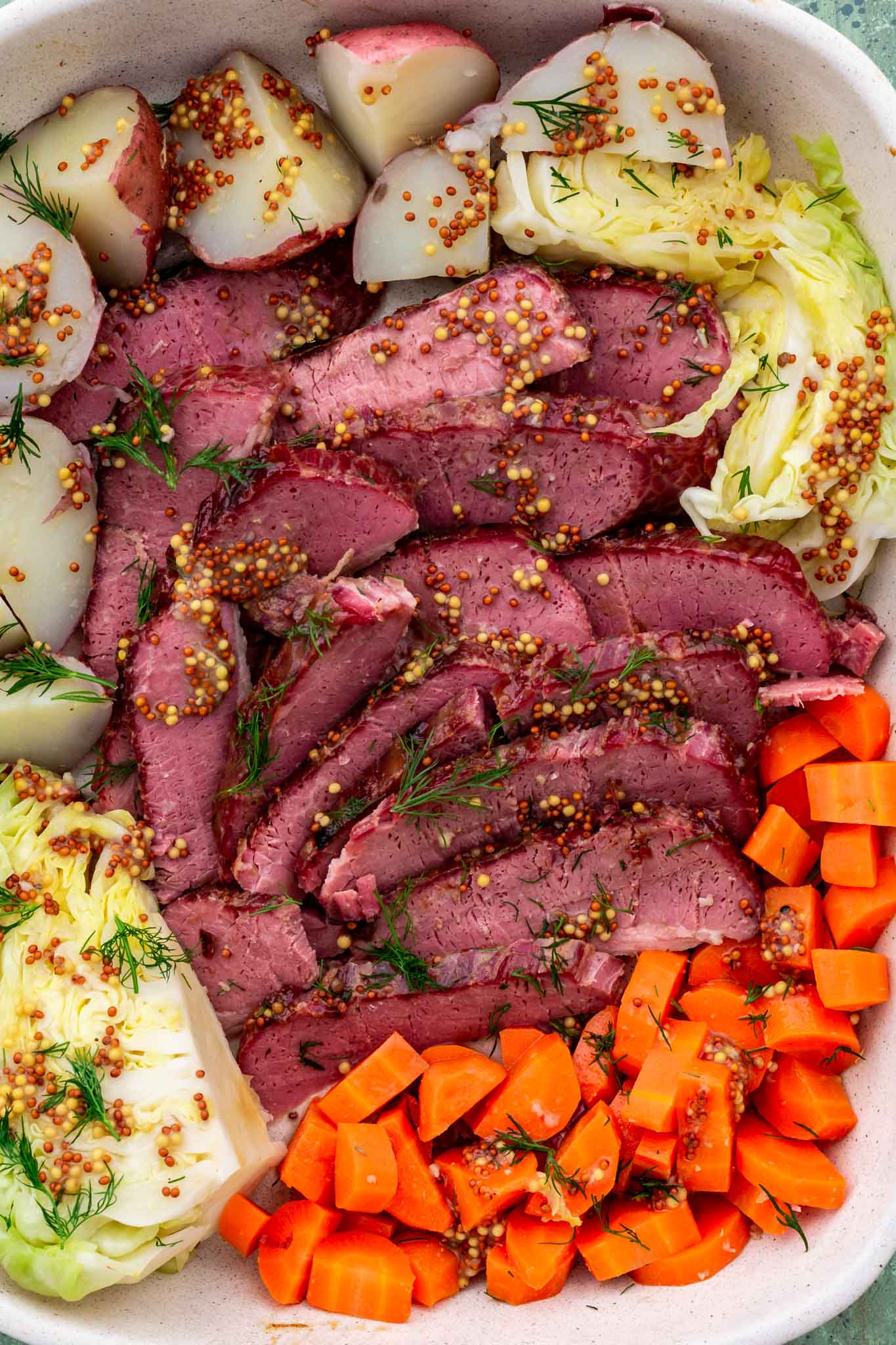
Saint Patrick's Day is coming up and I can't think of a better way to celebrate than with a homemade corned beef dinner!
Truth be told, I did not try corned beef until I moved to the States, as it is not popular in my home country. But fate got me married to an Irish American, so I eventually came across it.
The first time it was presented to me, I confess it wasn't a great experience. Boiled meat and veggies can be quite bland and I'm definitely more of a roasted or braised girl.
Well, after testing a few different ways to cook corned beef at home, it turns out that low and slow is the way to go. When you make it right, corned beef has a lot of flavor and has an amazing melt in your mouth texture that you can't recreate with other methods.
I also like to go the extra mile and make a mustard glaze. It adds more flavor and a bit of color and crust to the meat. It is totally optional, but if boiled meat turns you off, this can definitely make a difference!
As for veggies, you can't beat the classic cabbage, carrots and potatoes. To prevent mushy vegetables, I cook them after the corned beef is done. Start with the potatoes and carrots – cooking for 30 minutes – and add the cabbage at the end, as it will only take about 15 minutes to be ready!
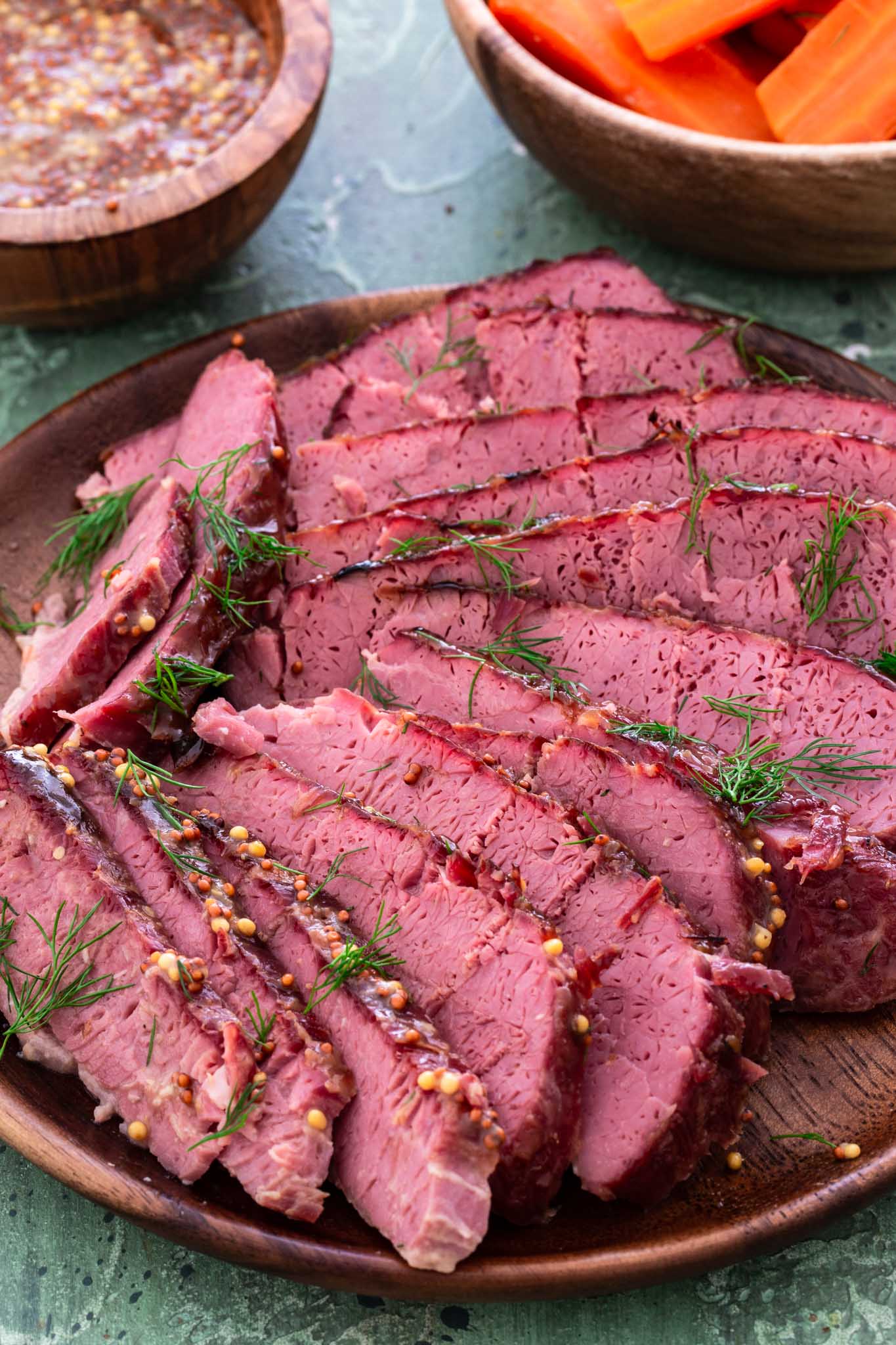
Is Corned Beef really Irish?
While corned beef is strongly associated with Saint Patrick's Day in the US, is it really Irish? Well, kind of.
According to the Smithsonian, if you go to Ireland today, you won't see Irish people eating corned beef, especially on St. Patty's Day. And although there was a time when corned beef was produced in great quantity in Ireland, that corned beef was very different than the one we know today.
What we recognize as Irish corned beef is actually Jewish. Irish immigrants in America almost solely bought their beef from kosher butchers, who made corned beef from brisket, a kosher cut of meat from the front of the cow. Since that is a tough cut, the salting and cooking methods transformed the meat into the super tender and flavorful corned beef that the Irish Americans used to eat back then and what we now know today.
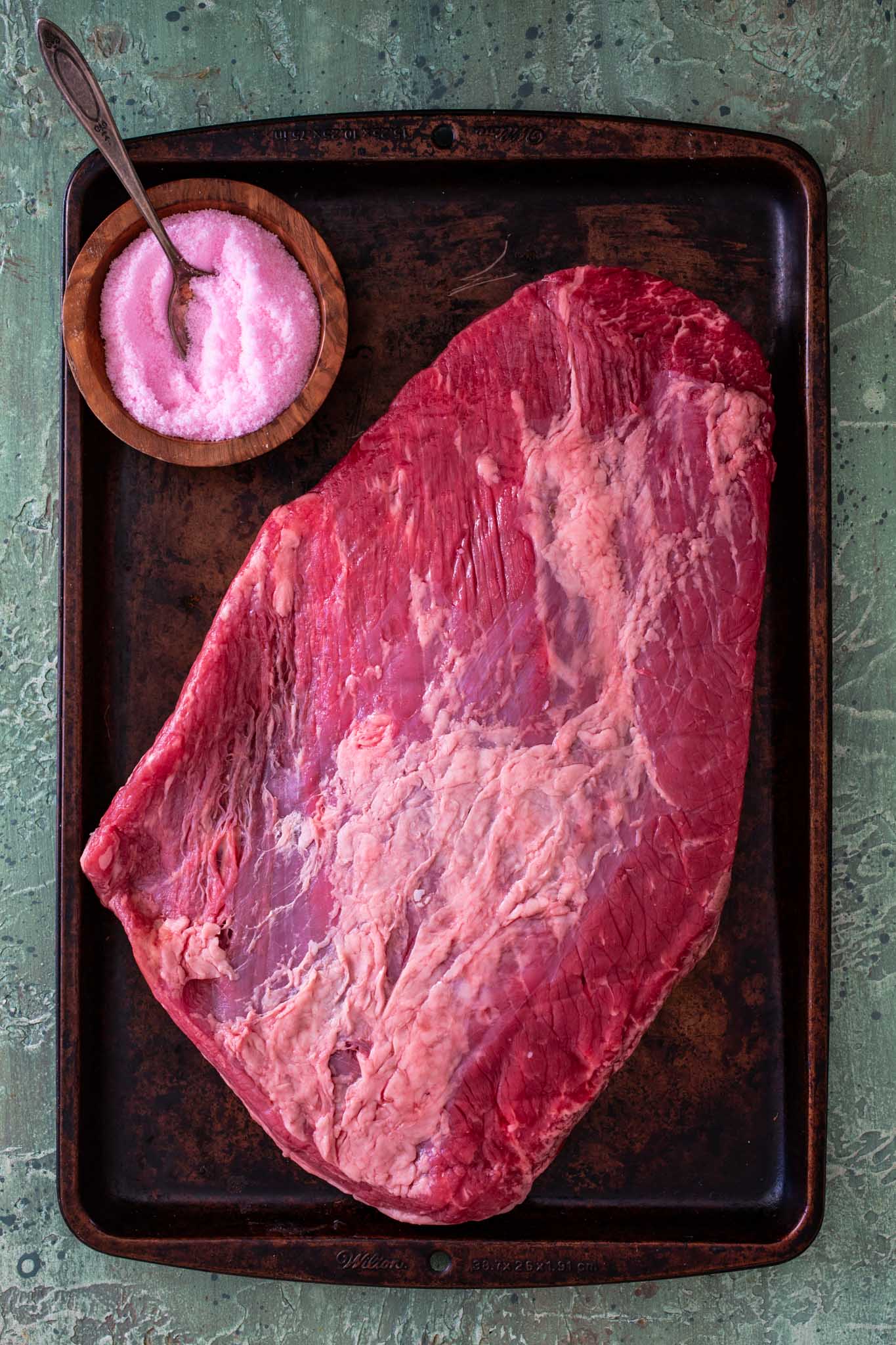
How to brine Corned Beef
First things first, you need to choose a cut of beef.
As you know, corned beef is traditionally made of brisket, which is a great cut to slow cook. And that is, and always will be, my favorite cut for corned beef! You will sometimes find store bought corned beef made with round or rump roast, but – in my opinion – that doesn't compare to brisket in both flavor and texture.
Another thing to consider is choosing between a brisket flat cut and a point cut. The point cut has more marbling and is thicker, therefore it will be more tender (to the point that it will fall apart when you try to cut it) and more flavorful. The flat cut is much leaner and will be easier to slice.
Once you've chosen your beef, all you have to do is make your brine with water, regular salt, pink salt, pickling spices and sugar. The beef will bathe in this brine for 7 to 10 days and will then be ready to cook!
I highly recommend that you flip the meat every day as well as give a quick stir on the brine, to prevent the salt from sinking to the bottom.
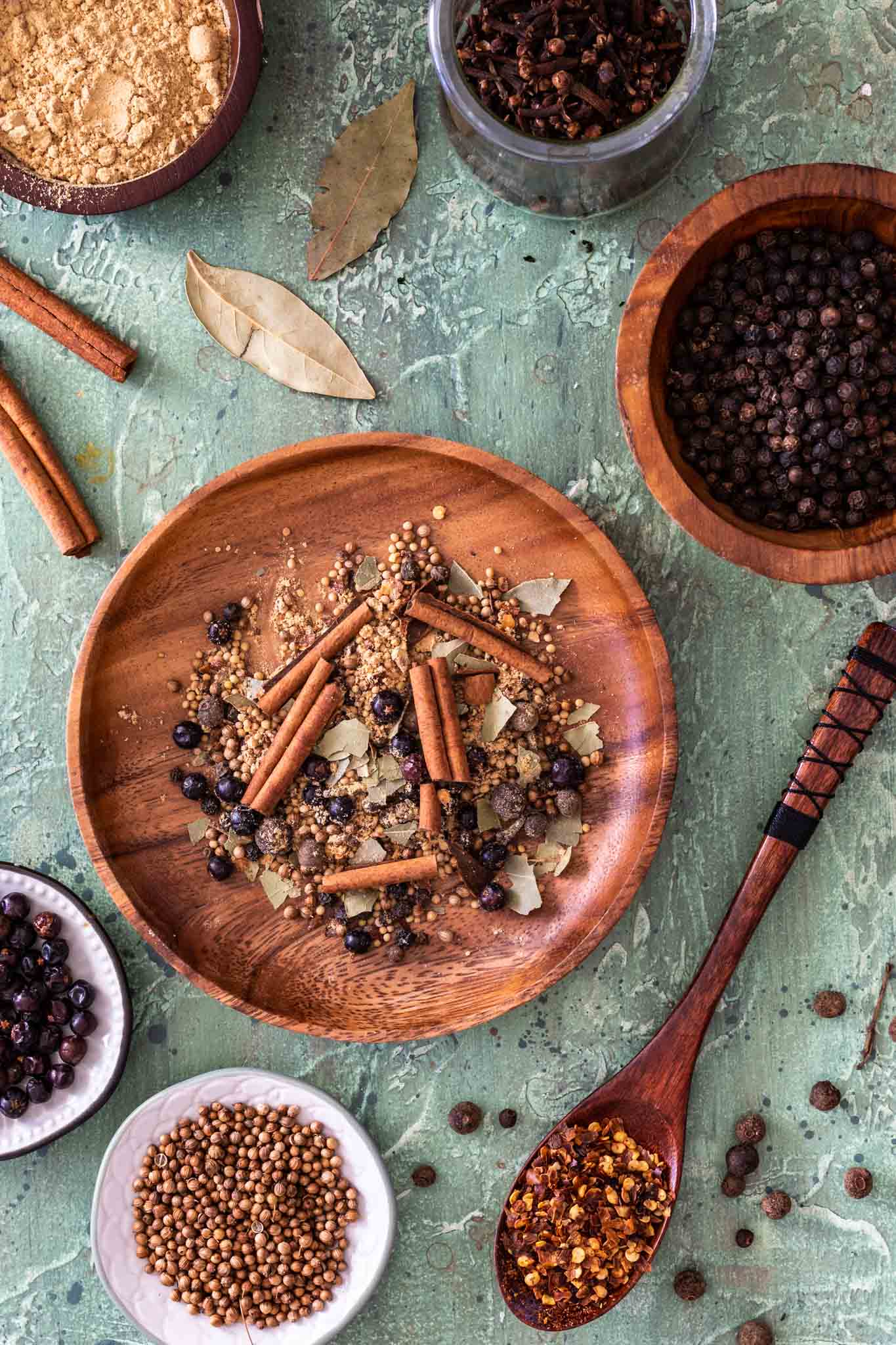
Homemade Pickling Spice
If you're anything like me, you probably have a whole lot of spices at home. So why add buy pickling spice when you can make your own blend with what's already in your spice cabinet?
I developed a recipe that will make just enough to use for this corned beef recipe. But if you go through a lot of pickling spice, just double (or triple) the recipe! A batch of pickling spice will last around a year and can be used in several dishes.
Here's what you'll need:
- All spice berries
- Black pepper corns
- Mustard seeds
- Whole Cloves
- Coriander seeds
- Red pepper flakes
- Ginger powder
- Nutmeg
- Juniper berries
- Bay leaves
- Cinnamon stick
Most of these are whole spices! Don't substitute for ground.
No need to fret if you don't have all the ingredients. You can customize and make a blend with what you already have, or buy just the essentials (black peppercorns, mustard seeds and cinnamon).
Still too much work? Then you can buy pickling spice at your local grocery store or online. It will work just fine!
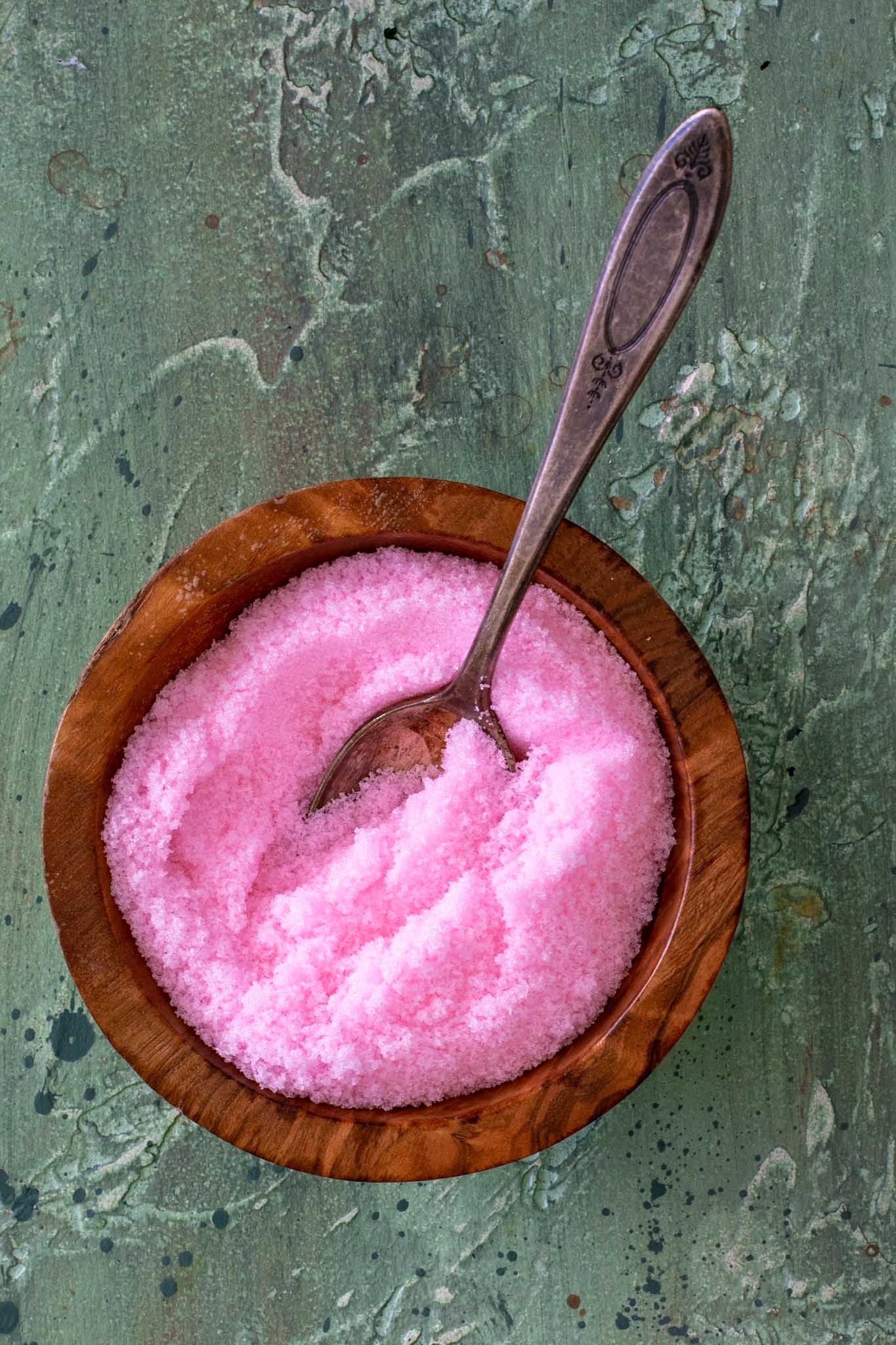
What is Pink Salt?
Pink salt, or saltpeter, is the reason why corned beef is pink. It is a mixture of sodium chloride and sodium nitrite that is dyed pink to prevent people from confusing it with regular salt.
The nitrites not only give us the beautiful pink color but also help preserve the meat (by inhibiting the growth of bacteria) and provide that tangy flavor that is characteristic to corned beef.
So while you can certainly make corned beef without it, it won't taste and look the same.
IMPORTANT: Make sure you're buying pink CURING salt and not pink Himalayan salt, which is entirely different. Also, you will often find pink curing salt labeled asCuring Salt #1 and Curing Salt #2. Do not buy the #2, as that is used for air cured meats, like salami and pepperoni, that won't be cooked.
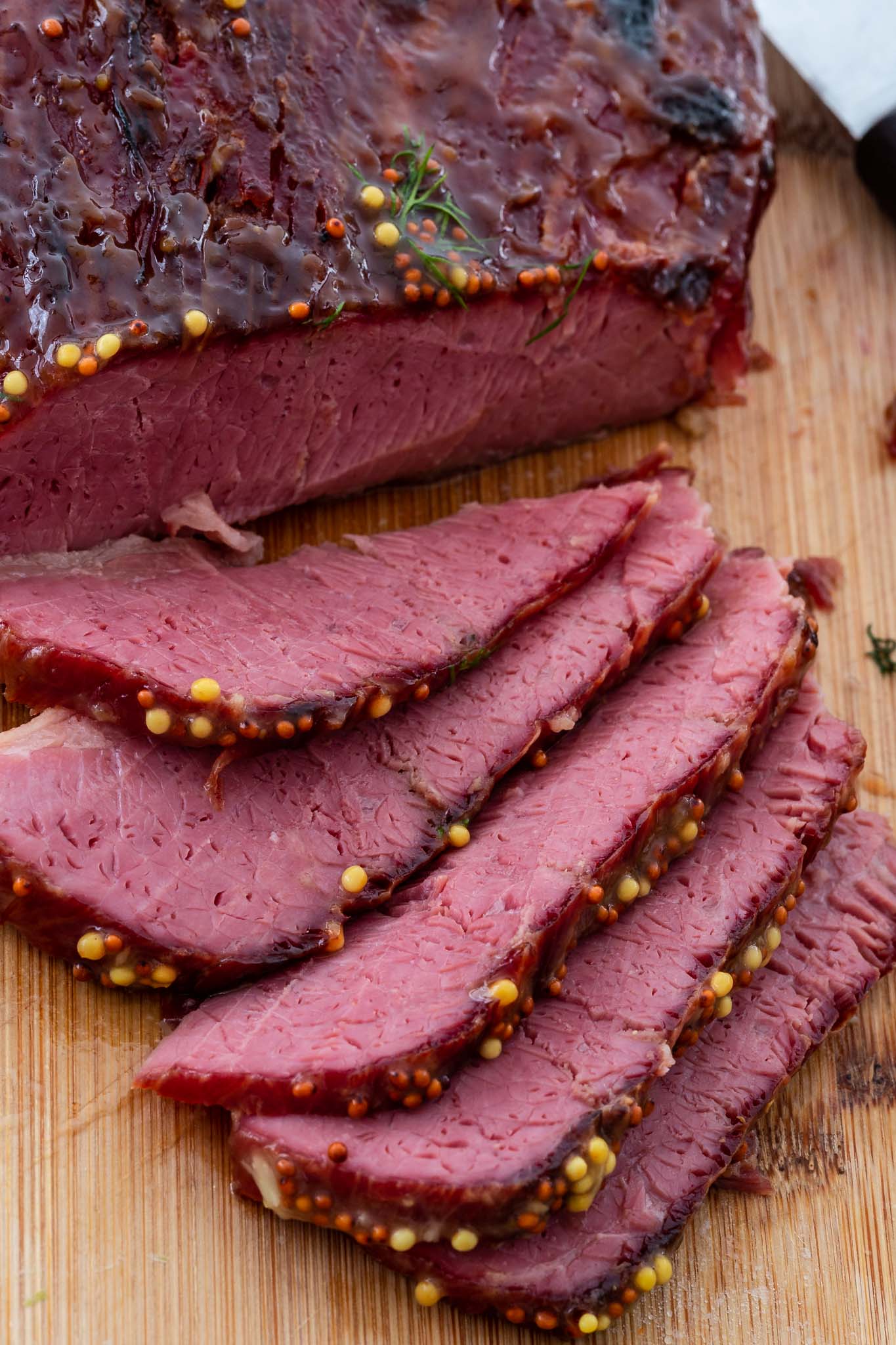
How to Slice Corned Beef?
Since corned beef is made from tough cuts of meat, it should be sliced against the grain.
But what does that mean, exactly?
The "grain" of the meat refers to the direction that the muscle fibers are aligned. In tougher cuts, like brisket, they are clearly defined and therefore easy to identify.
Once you've located the direction of the grain, use a sharp knife to slice across it, rather than parallel to it. When you slice against the grain, you are shortening the muscle fibers and making the meat more tender and easier to chew.
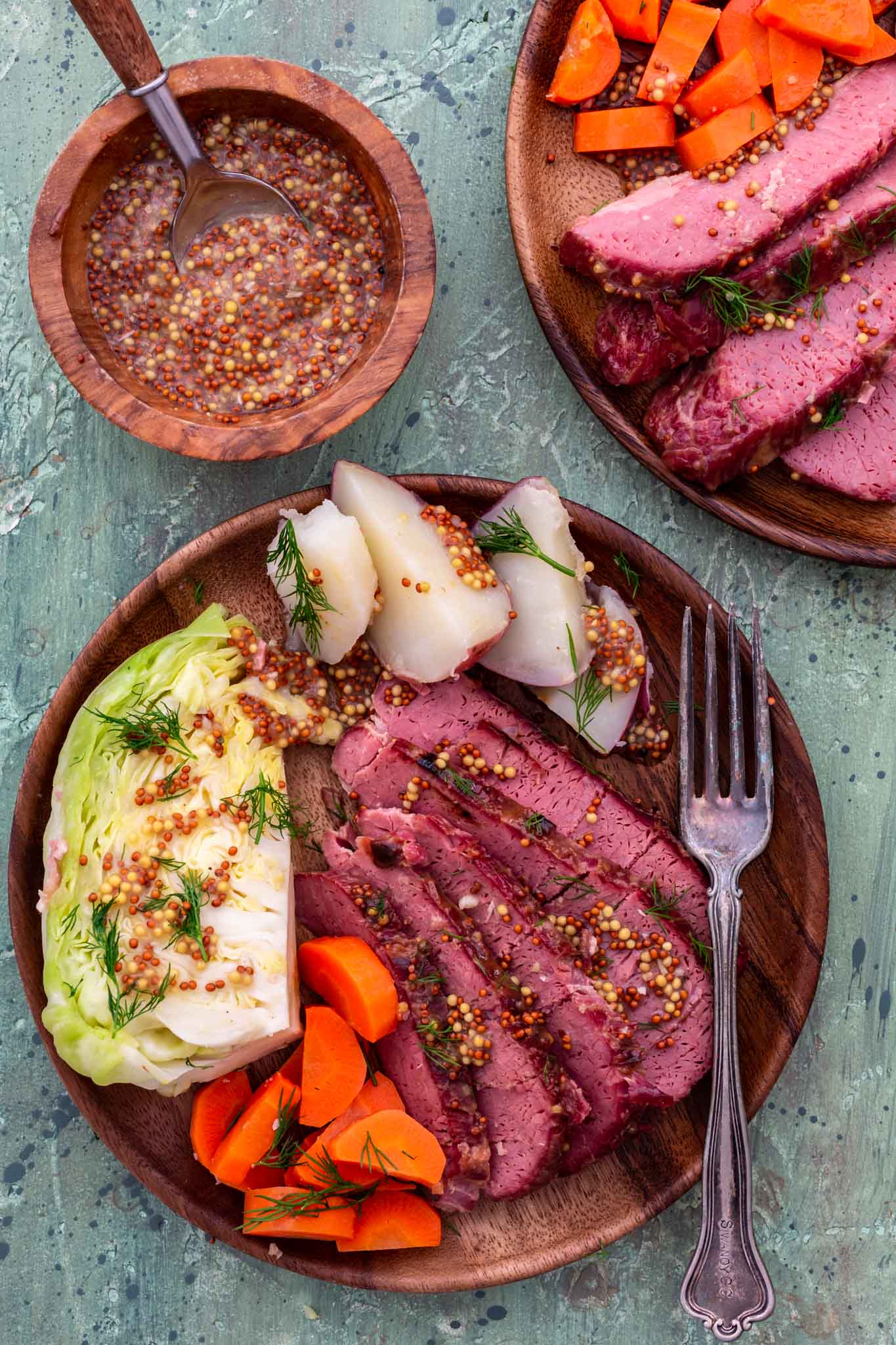
What to serve with corned beef?
A traditional Saint Patrick's Day feast consists of a "boiled dinner" of corned beef, cabbage, potatoes and carrots. But that doesn't mean you can't change things up, if you so desire. Corned beef goes great mashed potatoes or colcannon!
For me, good mustard is always a must! Also, some crusty bread – or, if you want to stick to the Irish theme, soda bread.
Just make sure you pace yourself so you can have some leftovers to make classic Reuben sandwiches. Oh, my mouth waters just thinking of those sandwiches!
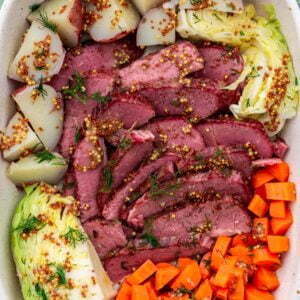
Homemade Corned Beef
Fall apart tender corned beef is easy to make from scratch and will produce better flavor than store bought! Just make sure to allow the meat to brine for 7-10 days before Saint Patrick's Day.
Brine and Brisket
- 2 to 3 tablespoons pickling spice, recipe follows
- 1 cup kosher salt
- 2 tablespoons pink curing salt
- 1/2 cup brown sugar
- 3 garlic cloves, smashed
- 1 4 to 5 pounds beef brisket, trimmed
- 1 onion, quartered
- 1 head of garlic, halved crosswise
Pickling Spice
- 2 teaspoons mustard seeds
- 1 teaspoon all spice berries
- 1 teaspoon black pepper corns
- 1 teaspoon coriander seeds
- 1 teaspoon red pepper flakes
- 1 teaspoon ground nutmeg
- 1 teaspoon juniper berries
- 1/2 teaspoon ginger powder
- 1/2 teaspoon whole cloves
- 2 bay leaves, crumbled
- 1 cinnamon stick, smashed
Glaze (optional)
- 2 tablespoons butter
- 1/2 cup brown sugar
- 1/2 cup Dijon mustard
- 1/2 cup water
Making the Pickling Spice:
-
Combine all the spices in a bowl. Reserve.
Making the brine:
-
In a large stockpot, combine 2 quarts of water with the pickling spice, salt, pink salt, brown sugar and 3 smashed garlic cloves. Bring to a boil and cook until the salt and sugar have dissolved.
-
Remove the brine from the heat and let it cool to room temperature, then refrigerate until chilled.
Brining the brisket:
-
Place brisket in a 2-gallon ziplock bag or brining container and add the brine, making sure the beef is submerged. Seal and refrigerate for 7 to 10 days, flipping the brisket once every day.
Cooking the Corned Beef:
-
Remove brisket from brine and rinse well under cold water. Run the brine solution through a strainer and reserve the pickling spices.
-
Add the quartered onion and halved garlic head to a large Dutch oven. Set the corned beef on top of that and cover with water by several inches. Add the reserved pickling spice. Set over high heat and bring to a boil. Let it boil for 15 minutes and then reduce to a simmer. Cover and gently simmer for 3 to 4 hours or until the meat is fork tender.
-
If doing the glaze, preheat broiler. While broiler is preheating, melt the butter in a sauce pan, over medium high heat, and add the brown sugar and water. Once sugar has dissolved, add the mustard and simmer for another couple of minutes. Reserve.
-
When corned beef is done, remove from the liquid (you can use that liquid to cook cabbage, carrots and potatoes) transfer to a baking sheet and brush glaze all over it. Broil for 20 minutes, brushing more glaze as needed.
-
Slice corned beef against the grain. Serve with veggies and mustard.
- If using store bought corned beef, skip to "Cooking the Corned Beef" section.
Other recipes for St. Patrick's Day:
- Homemade Irish Cream
- Guinness Chocolate Cake
- Stout Beer Braised Short Ribs
Source: https://www.oliviascuisine.com/homemade-corned-beef-recipe/
0 Response to "Whats That Pickling Flavor in Corned Beef and Cabbage"
Post a Comment